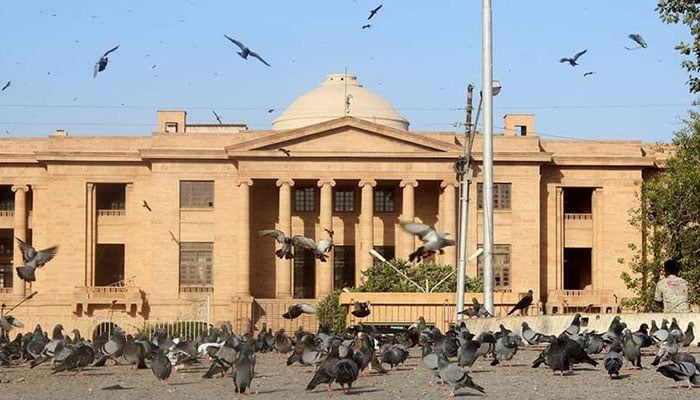SHC strikes down placement of name of Sindh CM’s adviser on ECL
The Sindh High Court (SHC) has struck down the ministry of interior’s memorandum with regard to the placement of the name of the Sindh chief minister’s adviser on prisons and inter-provincial coordination on the Exit Control List (ECL) and observed that he could travel abroad subject to the permission of the trial court.
The order came on a petition of Pakistan Peoples Party leader Aijaz Hussain Jakhrani, currently serving as the adviser on prisons and inter-provincial coordination in the Sindh government, who challenged the placement of his name on the ECL.
The petitioner’s counsel, Mohsin Shewani, submitted that the impugned action was taken on the recommendation of the National Accountability Bureau (NAB) for the fear that he might go absconding in an inquiry into the alleged accumulation of assets beyond known sources of income that was initiated against him in 2018.
The counsel submitted that one reference and two inquiries had been pending against him and now it was a settled principle that a mere pendency of investigations into a criminal case would not form a valid ground for placing the name of a person on the ECL as it curtailed the person’s fundamental right of movement and liberty guaranteed under the Constitution.
He submitted that the impugned memorandum with regard to the placement of the petitioner’s name on the ECL was issued in disregard of the settled principle of law and obiter dicta of the superior courts laying down as rule that mere pendency of the criminal cases would not disentitle a person from travelling abroad.
He submitted that the petitioner was sick and regularly went abroad for medical treatment.
NAB and a federal law officer opposed the petition and submitted that the petitioner had the remedy of review against the memorandum.
A division bench of the SHC headed by Justice Mohammad Iqbal Kalhoro, after hearing the arguments, observed that it had been settled that mere pendency of a criminal case would not ipso facto disentitle a person from travelling abroad and his right to movement and liberty guaranteed under the Constitution would not be curtailed.
The high court observed that the impugned restrictions did not seem to be maintainable, besides the impugned action was taken against the petitioner when the inquiry was pending against him, which later culminated into a reference filed before an accountability court and therefore, the petitioner’s movement within or outside the country be better left to be regulated by the trial court where his presence is required.
The SHC struck down the memorandum with regard to the placement of the petitioner’s name on the ECL.
The high court, however, observed that when the petitioner intended to travel abroad, he shall have to seek the permission from the trial court on the terms and conditions to be decided by the latter, if at all it acceded to such a request, for ensuring unhindered proceedings in the trial in his absence and securing his presence back in the trial in due course of time.
-
 James Van Der Beek's Friends Helped Fund Ranch Purchase Before His Death At 48
James Van Der Beek's Friends Helped Fund Ranch Purchase Before His Death At 48 -
 King Charles ‘very Much’ Wants Andrew To Testify At US Congress
King Charles ‘very Much’ Wants Andrew To Testify At US Congress -
 Rosie O’Donnell Secretly Returned To US To Test Safety
Rosie O’Donnell Secretly Returned To US To Test Safety -
 Meghan Markle, Prince Harry Spotted On Date Night On Valentine’s Day
Meghan Markle, Prince Harry Spotted On Date Night On Valentine’s Day -
 King Charles Butler Spills Valentine’s Day Dinner Blunders
King Charles Butler Spills Valentine’s Day Dinner Blunders -
 Brooklyn Beckham Hits Back At Gordon Ramsay With Subtle Move Over Remark On His Personal Life
Brooklyn Beckham Hits Back At Gordon Ramsay With Subtle Move Over Remark On His Personal Life -
 Meghan Markle Showcases Princess Lilibet Face On Valentine’s Day
Meghan Markle Showcases Princess Lilibet Face On Valentine’s Day -
 Harry Styles Opens Up About Isolation After One Direction Split
Harry Styles Opens Up About Isolation After One Direction Split -
 Shamed Andrew Was ‘face To Face’ With Epstein Files, Mocked For Lying
Shamed Andrew Was ‘face To Face’ With Epstein Files, Mocked For Lying -
 Kanye West Projected To Explode Music Charts With 'Bully' After He Apologized Over Antisemitism
Kanye West Projected To Explode Music Charts With 'Bully' After He Apologized Over Antisemitism -
 Leighton Meester Reflects On How Valentine’s Day Feels Like Now
Leighton Meester Reflects On How Valentine’s Day Feels Like Now -
 Sarah Ferguson ‘won’t Let Go Without A Fight’ After Royal Exile
Sarah Ferguson ‘won’t Let Go Without A Fight’ After Royal Exile -
 Adam Sandler Makes Brutal Confession: 'I Do Not Love Comedy First'
Adam Sandler Makes Brutal Confession: 'I Do Not Love Comedy First' -
 'Harry Potter' Star Rupert Grint Shares Where He Stands Politically
'Harry Potter' Star Rupert Grint Shares Where He Stands Politically -
 Drama Outside Nancy Guthrie's Home Unfolds Described As 'circus'
Drama Outside Nancy Guthrie's Home Unfolds Described As 'circus' -
 Marco Rubio Sends Message Of Unity To Europe
Marco Rubio Sends Message Of Unity To Europe




